A Cloud-based Online Access on Smart Energy Metering in the Philippines( Vol-5,Issue-6,June - June 2019 ) |
|
Author(s): Dexter L. Bautista, Dyna G. Catabona, Marlon I. Lachica, Loreto H.Barrogo, Noel T. Florencondia |
|
Keywords: |
|
|
Cloud-computing, commercial and industrial utilization, power electric subsystem, smart energy metering. |
|
Abstract: |
|
|
This qualitative study was conducted to identify how smart energy metering could utilize the energy consumption remotely through cloud-computing and the utilization of the data management, and data visualization of a cloud-computing. Participants are working directly in smart energy metering and cloud-computing. Results revealed that most participants believed that smart energy metering can be controlled by cloud-computing and smart energy metering offers a robust and reliable modem enabling efficient communication. Moreover, some participants believed that existing application can deliver accurate data analysis, management, operations, and customer engagement. Few participants were direct users of cloud-computing but in some utilizations particularly in high-rise buildings, malls, and manufacturing plants, they were using cloud-computing to monitor their power usages and the harmonics power supplies in their facilities. Participants believed that application can edit, collect, deliver data through the utility-grade of meter data management system and most of cloud-based has utility on data visualization from web-based energy portal and reporting tools for consumers and utilities. Some participants said thatthe system is usually compatible in the SAP system. More so, most participants believed, that the scalability, central data storage, cost-efficiency, real-time response, and securities are advantages of the system and the location of data, inefficient cloud security policy, mixing of data, term of agreement, compatibility, application programming interfaces, redundant data management and disaster recoveries are the challenges of the system. |
|
Cite This Article: |
|
| Show All (MLA | APA | Chicago | Harvard | IEEE | Bibtex) | |
Share: |
|

 DOI:
DOI: 



























